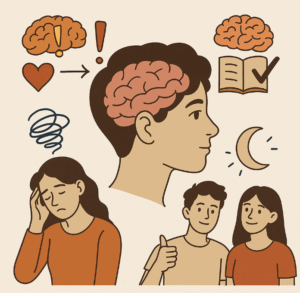The Adolescent Brain and Emotional Development: Why Teenagers Feel and React Differently
 If you’ve ever wondered why teenagers can be full of energy one moment and moody or withdrawn the next, the answer lies in the brain. Adolescence is not just about physical growth — it’s also a time of major rewiring inside the brain. This explains why emotions, identity, and decision-making feel so intense during these years.
If you’ve ever wondered why teenagers can be full of energy one moment and moody or withdrawn the next, the answer lies in the brain. Adolescence is not just about physical growth — it’s also a time of major rewiring inside the brain. This explains why emotions, identity, and decision-making feel so intense during these years.
How the Adolescent Brain Changes
-
The Limbic System (Emotions and Reward)
-
This part of the brain, especially the amygdala, develops earlier.
-
It makes teenagers more sensitive to rewards, risks, and emotions.
-
Result: they may seek thrill, novelty, or approval from peers.
-
-
The Prefrontal Cortex (Control and Planning)
-
This area — responsible for reasoning, impulse control, and long-term planning — matures later, usually in the mid-20s.
-
Until then, emotional reactions often “override” logical decision-making.
-
-
Brain Chemicals (Neurotransmitters)
-
Dopamine levels fluctuate, making pleasures feel more intense.
-
Serotonin levels shift, sometimes leading to mood swings or irritability.
-
Why Emotions Feel So Intense in Teenagers
-
Mood swings: due to hormonal changes combined with brain development.
-
Peer pressure sensitivity: the adolescent brain gives high value to social acceptance.
-
Sleep disruption: natural changes in circadian rhythm make teens stay up late, leading to fatigue and irritability.
-
Identity struggles: as the brain matures, self-reflection increases, sometimes leading to confusion or self-doubt.
Mental Health Challenges Linked to Adolescent Brain Development
-
Anxiety and Depression
-
Increased self-consciousness and peer comparison can trigger persistent sadness or worry.
-
-
Risky Behaviors
-
Experimenting with substances, unsafe driving, or unprotected sex can occur due to heightened reward-seeking.
-
-
Obsessive Thoughts
-
With a still-developing prefrontal cortex, intrusive thoughts can feel overwhelming and hard to dismiss.
-
-
Sleep Problems
-
Delayed sleep cycle combined with school demands often leads to insomnia and daytime fatigue.
-
How to Support Healthy Emotional Development
-
Open Communication: Encourage teens to share feelings without judgment.
-
Set Boundaries with Empathy: Clear rules with flexibility work better than rigid control.
-
Healthy Lifestyle: Balanced diet, exercise, and good sleep support brain health.
-
Mindfulness and Therapy: CBT, mindfulness practices, or counseling help with stress and intrusive thoughts.
-
Limit Harmful Digital Exposure: Guidance on social media and pornography use can reduce pressure and comparison.
Takeaway
The teenage brain is still under construction. While this makes adolescents more vulnerable to mood swings, peer pressure, and risky choices, it also makes them highly adaptable and capable of growth. Understanding the science behind these changes can help parents, teachers, and teenagers themselves navigate this stage with more patience and support.
👨⚕️ Consultation
I’m Dr. Srinivas Rajkumar T, Consultant Psychiatrist at Apollo Clinic, Velachery, Chennai.
I work with adolescents and adults dealing with issues related to identity, anxiety, intrusive thoughts, depression, and sleep problems. My approach combines structured therapy with safe, evidence-based use of medication — focusing on long-term well-being rather than quick fixes.
📞 Contact: +91 8595155808